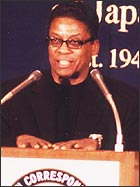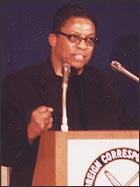|
|
 |
 |
 |
 |


|
Welcome
to our first issue of TOKYO JAZZ MAGAZINE.On this issue, we will introduce some
of Mr.Hancock's thoughts on TOKYO JAZZ.
( Professional Luncheon
at The Foreign Correspondents' Club of Japan, Feb.20th,2003)
|
 |
| |
Question:
Could you tell us a little bit about why you are involved with this upcoming TOKYO
JAZZ?
Mr. Hancock:
|


|
Oh, why am
I involved in Tokyo Jazz? I was asked to participate as a co-producer, and for
me, it seemed an interesting prospect to be involved in putting a jazz festival
together. I always like to look outside the box of just being a musician and see
what situations I can accept and learn from those situations. Also, there are
certain concepts that to me are very important and I am always trying to push,
and I thought that my involvement as a co-producer of Tokyo Jazz would give me
an opportunity to kind of push some of these ideas, and one of them is the importance
of nurturing a new generation of jazz listeners. And if we do not make some inroads
into bridging the gap between the young audience that is pooled by Brittany Spears
and Eminem, if we do not make some kind of bridge to show that there is something
for them in jazz, too, then jazz will die. If we do not have an audience, then
how can the music survive? So one thing is paying attention to our youth. The
other thing that is important to me is the promotion of global concepts, the fact
that we have this one human family, and that communication and technology brings
up closer and closer together on one hand and sometimes it brings us further and
further apart on another. But anyway, these are some of the reasons why I wanted
to work as a co-producer for Tokyo Jazz. And the people that I am working with
have similar viewpoints that I have. So, we all kind of stand for the same kind
of thing.
|
| |
Question:
Do you have any information to give us about TOKYO JAZZ2003?
Mr. Hancock:
|


|
The things
that we attempted to do last year that would give Tokyo Jazz a somewhat unique
presence as far as jazz festivals are concerned, are things like, as I mentioned
before, attention to bridging the gap between the tastes of our young people,
and this beautiful golden mine that we call jazz, this creative musical core that
we call jazz, and paying attention to how we can, on one hand, exemplify what
this young lady was talking about, which is a very open eclectic viewpoint which
looks for new combinations of music and things that can be surprising. For example,
we had the Super Unit before which was different each of the two days. We want
to continue to do that this year because it really worked out well last year.
So we are going to have again, a Super Unit, which nobody knew what that was going
to be, but it worked out very well, and I do not know of any other festival that
has anything like that. So we are going to do a similar kind of thing this year
with the artists. We want to make that part of what Tokyo Jazz is about. And we
also want to, again, instill a touch of different parts of the world in Tokyo
Jazz. So there will be some kind of, for example, European presence or Latin American
presence, Asian presence, American presence, because jazz is really a global music.
And we also want to continue to keep the format with a kind of fresh looseness
that I always feel is a very important part of jazz, that it is not a rigid kind
of art form. It is able to change and adapt.
|

BACK
|
|
|
 |
|
